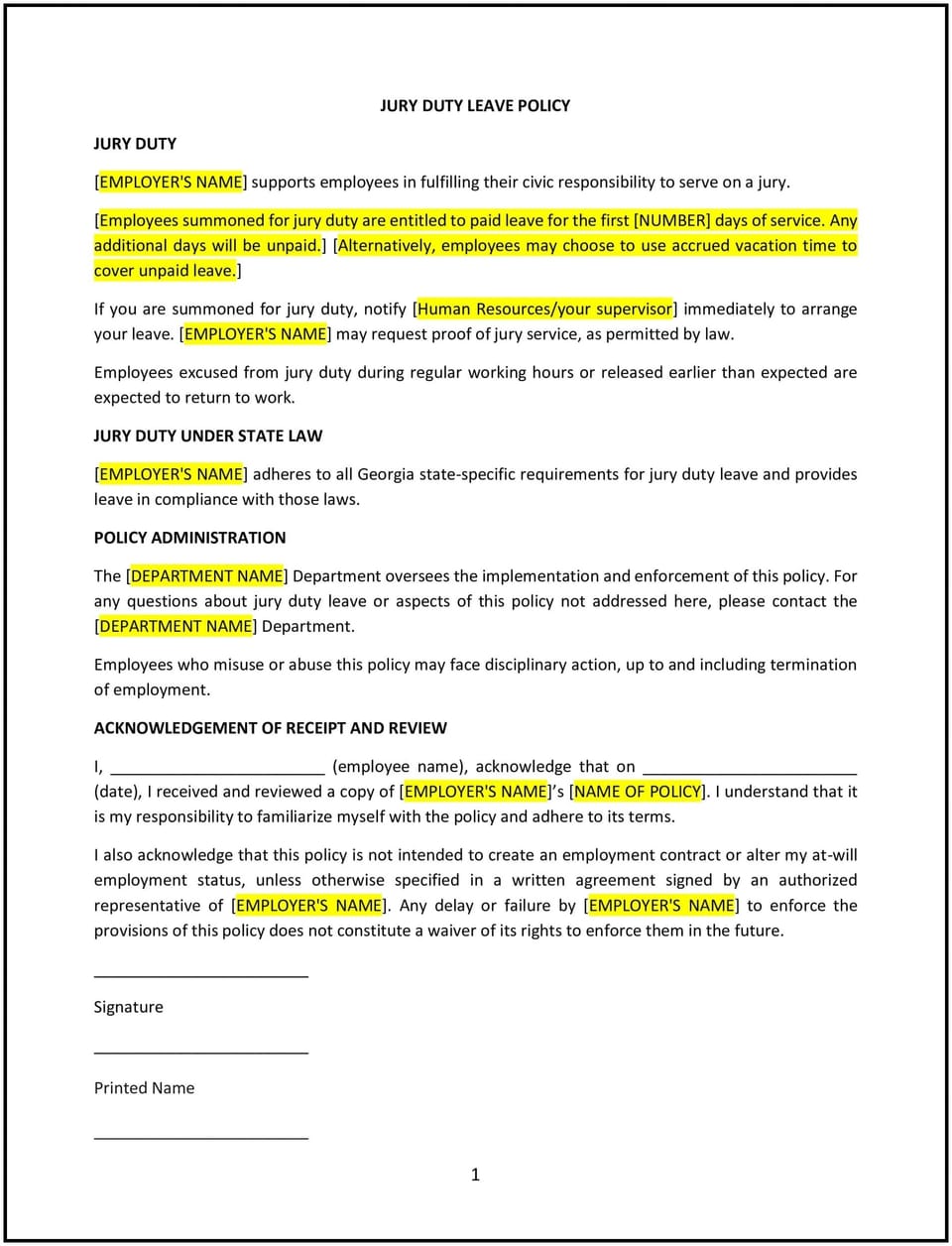Jury duty leave policy (Georgia): Free template

Jury duty leave policy (Georgia)
This jury duty leave policy is designed to help Georgia businesses provide employees with time off to fulfill their civic duty of serving on a jury. The policy outlines eligibility, notification procedures, and how jury duty leave will be managed to support both employees and business operations.
By implementing this policy, businesses can demonstrate civic responsibility, support employees, and minimize disruptions during jury service.
How to use this jury duty leave policy (Georgia)
- Define eligibility: Clearly state that all employees summoned for jury duty are eligible for leave, regardless of employment status or tenure.
- Establish notification procedures: Require employees to inform their supervisor or HR promptly upon receiving a jury summons and provide a copy of the notice.
- Address compensation: Specify whether jury duty leave is paid or unpaid and outline any conditions for pay, such as providing proof of attendance.
- Include return-to-work guidelines: Ensure employees understand their right to return to their role or an equivalent position after completing jury duty.
- Protect employees from retaliation: Reinforce that employees cannot be penalized for taking time off to serve on a jury.
- Set reporting expectations: Encourage employees to notify the company of any significant changes to their jury service, such as delays or extended service.
- Review and update regularly: Periodically assess the policy to ensure it reflects changes in Georgia jury duty laws or workplace practices.
Benefits of using this jury duty leave policy (Georgia)
Implementing this policy provides several advantages for Georgia businesses:
- Supports civic engagement: Encourages employees to participate in their legal obligation to serve as jurors.
- Enhances trust: Employees feel supported when businesses accommodate their jury duty needs.
- Minimizes misunderstandings: Clear guidelines help employees and managers navigate jury duty obligations effectively.
- Promotes fairness: Consistent application of the policy ensures equal treatment for all employees.
- Reflects Georgia-specific considerations: Tailoring the policy to local legal requirements and practices ensures its practicality.
Tips for using this jury duty leave policy (Georgia)
- Communicate the policy: Ensure all employees are aware of their rights and responsibilities regarding jury duty leave.
- Track jury duty dates: Maintain records of employee jury service to manage scheduling and minimize operational disruptions.
- Provide support: Offer guidance to employees on handling extended jury service or managing work responsibilities during leave.
- Plan for coverage: Develop contingency plans to redistribute work during an employee’s jury service.
- Adapt as needed: Update the policy to address feedback or changes in Georgia jury duty regulations.
Q: Are employees eligible for jury duty leave if they are part-time?
A: Yes, all employees, including part-time workers, should be eligible for jury duty leave under this policy.
Q: Is jury duty leave paid or unpaid?
A: Businesses should specify whether leave is paid or unpaid in their policy, taking into account local practices and organizational capabilities.
Q: How should employees notify their employer about jury duty?
A: Employees should provide a copy of the jury summons to their supervisor or HR as soon as possible and keep them updated on any changes.
Q: Can employees be penalized for serving on a jury?
A: No, businesses should protect employees from retaliation or penalties for fulfilling their jury duty obligations.
Q: What documentation should employees provide after completing jury duty?
A: Employees should submit proof of attendance, such as a certificate from the court, if required by the business.
Q: How can businesses manage workloads during an employee’s jury duty leave?
A: Businesses should redistribute tasks among team members or hire temporary support to cover the employee’s responsibilities.
Q: How often should this policy be reviewed?
A: The policy should be reviewed annually or as needed to reflect changes in Georgia laws or business operations.
This article contains general legal information and does not contain legal advice. Cobrief is not a law firm or a substitute for an attorney or law firm. The law is complex and changes often. For legal advice, please ask a lawyer.


